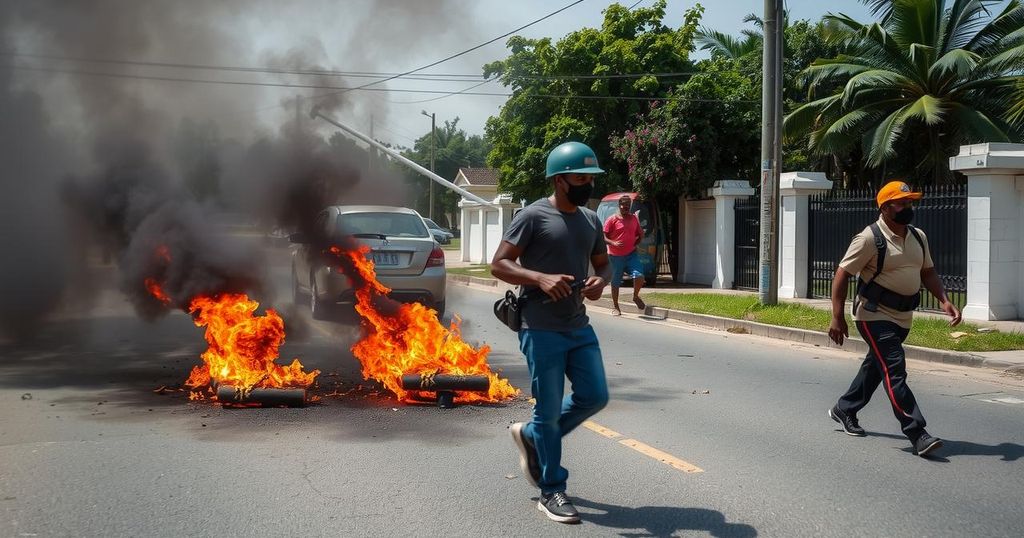On December 27, 2024, Mozambique faced significant unrest following a disputed election, which resulted in the ruling Frelimo party maintaining power. Major cities, particularly Maputo and Matola, saw businesses close and protests escalate into violence, leading to numerous deaths and looting. The situation has drawn international concern, with calls for dialogue to achieve peace in the nation.
On December 27, 2024, major cities in Mozambique, including the capital Maputo and its suburb Matola, have descended into a state of turmoil following post-election violence. The unrest ignited after the Constitutional Council confirmed the ruling Frelimo party, led by Daniel Chapo, secured a controversial 65% of the vote in the October presidential election, an adjustment down from nearly 71%. Consequently, civil order has been disrupted, with many businesses shuttered and transport systems halted due to rampant demonstrations from opposition groups amidst incidents of looting and vandalism.
The protests, which have escalated into severe clashes with law enforcement, have led to significant property damage, including the burning of buildings and ransacking of supermarkets. Witness accounts describe chaos, such as a resident observing looters taking various items during an incident in Maputo’s Praca dos Combatentes. Tragically, the violence has claimed numerous lives, including at least eleven individuals who died when a fire broke out in a looted warehouse in the Benfica neighborhood.
Maputo’s citizens have set up barricades in various neighborhoods, illustrating their dissatisfaction and desire for change. One resident implored, “We are tired, after all, what is democracy for? We don’t want Frelimo anymore and we will fight. We only want the best for our country.” Police have attributed the chaos to criminal elements responsible for assaults on shops and warehouses, a sentiment echoed by Police Chief Bernardino Rafael. In response, opposition leader Venancio Mondlane criticized law enforcement for failing to ensure safety and inciting looting, while he continues to call for peaceful protests against the Frelimo administration.
In the context of these events, the ongoing violence has led to the deaths of at least 248 individuals, with alarming reports indicating a prison break that allowed approximately 1,500 inmates to escape, exacerbating the situation. United Nations Secretary-General Antonio Guterres has voiced his concerns about the violence and called for meaningful dialogue among political leaders to establish peace in Mozambique.
As Mozambique grappled with this unrest, the water marked a pivotal moment in its political landscape, raising questions about governance, civil rights, and future stability in a country that has endured decades of conflict. The urgent need for dialogue and reconciliation has never been more crucial.
Mozambique has been under the governance of the Frelimo party since its independence in 1975. The recent presidential elections have been marred by allegations of fraud and widespread unrest. The confirmation of election results by the Constitutional Council has fueled protests from opposition groups, dissatisfied with the continuing dominance of Frelimo. The unrest not only reflects political dissatisfaction but also a broader societal frustration with ongoing challenges such as poverty and violence, which have plagued the nation for decades. In such a volatile context, the announcement of results and the political climate post-election have triggered significant unrest, prompting concerns from international bodies such as the United Nations.
In conclusion, the post-election violence in Mozambique has resulted in widespread turmoil, with significant implications for the country’s civic order and political dynamics. The tragic loss of lives, rampant looting, and clashes with police reflect deep-rooted issues concerning governance and public discontent with the ruling party. As leaders both domestic and international call for dialogue, the path forward remains fraught with challenges. It is crucial for Mozambique’s leadership to engage in meaningful discussions to restore stability and address the grievances of its citizens.
Original Source: www.dw.com






